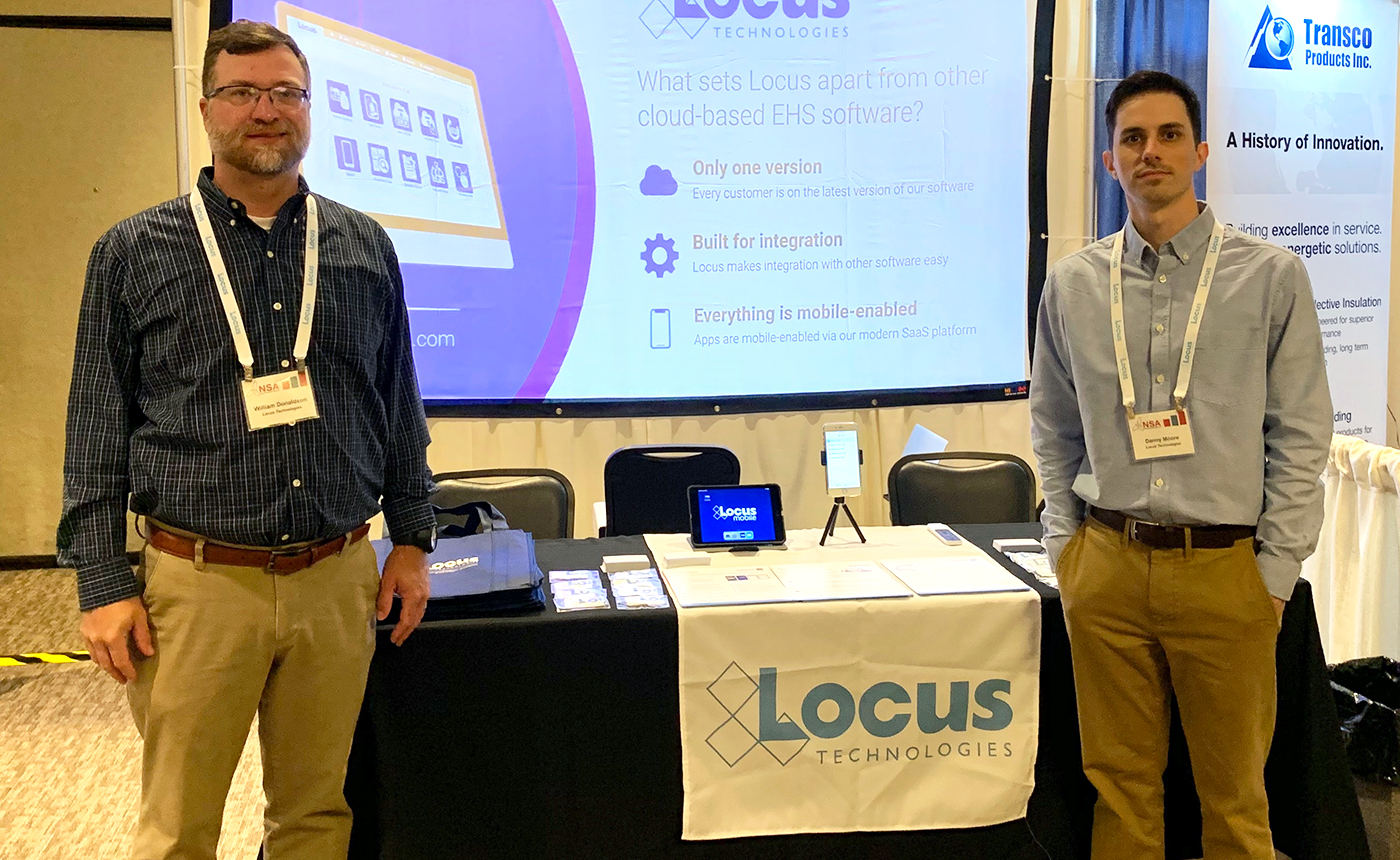Reviving the Nuclear Industry: How Locus’ Software is Leading the Way
At Locus, we are proud to play a pivotal role in this revival, building on our decades of expertise and deep roots in the nuclear sector.
At Locus, we are proud to play a pivotal role in this revival, building on our decades of expertise and deep roots in the nuclear sector.
MOUNTAIN VIEW, Calif., 2 March 2023 — Locus Technologies, the leading EHS Compliance and ESG software provider, received their 17th consecutive award from Environmental Business Journal (EBJ) for growth and innovation in the field of Information Technology in the environmental software with particular focus on EHS, compliance, sustainability, and ESG.
Locus continues to expand its ESG SaaS solution, including built-in business intelligence tools for interactive, actionable insights into unified EHS compliance and ESG data, forecasting tools predicting future ESG reporting, APIs for utility data sources, and interfaces with third-party systems that house ESG data. Locus’s ESG solutions focus on “enter once, report to many.” enabling companies the efficiency of reporting to multiple organizations and numerous standards from a single dataset. Essential built-in reporting includes state or federal regulations and ESG based on standards, including CDP, GRI, SASB, TCFD, and many others.
“Locus’s pioneering work in integrated ESG reporting and EHS compliance software is paying off. As one of the early SaaS leaders in net-zero digital solutions for ESG reporting, Locus continues to provide value to companies that want to be credible with their carbon reporting and sustainability software.” said Grant Ferrier, president of Environmental Business International Inc. (EBI), publisher of Environmental Business Journal.
“With energy transition, climate resilience, and new federal programs driving business, as well as traditional environmental market drivers in infrastructure, air quality, remediation, water and wastewater it is understandable that companies that offer integrates SaaS platform like Locus has advantage.” added Ferrier.
“As Locus continues to expand our EHS and ESG software we would like to thank EBJ for recognizing Locus again for a 17th consecutive year and for noting the new functionality and growing customer base we achieved in 2022. Locus will continue this trajectory into 2023 with new tools designed to simplify EHS and ESG management in our award-winning Locus software, which offers a single system of record and truth for our customers. Locus SaaS platform enables our customers to manage their carbon transactions and inventory with the same rigor, confidence, and transparency as their financial ones.” said Neno Duplan, the Founder and CEO of Locus Technologies.
MOUNTAIN VIEW, Calif., 24 February 2022 — Locus Technologies, the leading EHS Compliance and ESG software provider, was awarded a 16th consecutive award from Environmental Business Journal (EBJ) for growth and innovation in the field of Information Technology in the environmental software with particular focus on ESG.
EBJ is a business research publication providing strategic business intelligence to the environmental industry. Locus received the 2021 EBJ Award for Information Technology by growing and innovating its unified EHS compliance and ESG software platform.
In 2021 Locus took a leading market position in the fast-growing space of ESG software. Locus’s ESG SaaS covers carbon data aggregation via a powerful visual calculation engine, investor-grade emissions calculations audit capabilities, reporting to multiple standards from a single data set, integration APIs, dashboards, and carbon reduction goal setting and tracking. This separates Locus from competitors as customers demand integrated net-zero ESG software that supports investor-grade data in disclosure rules such as the EU’s corporate sustainability reporting directive, mandatory TCFD reporting, and anticipated SEC action on climate disclosures.
In 2021 Locus continued to expand its ESG SaaS to include built-in business intelligence tools allowing for interactive, actionable insights into EHS and ESG data, forecasting tools to predict future ESG reporting, APIs linking to utility meters, and interfaces with other Locus and third-party systems that house ESG data. Locus’s ESG application is focused on “enter once, report many times.” The gold standard for multinational enterprises with many locations worldwide is to have a system configured to report to multiple organizations and many standards from a single dataset. Essential built-in reporting in the Locus ESG app includes state or federal regulations, internal CSR, and ESG based on whatever standard their organization adheres to, such as CDP, GRI, SASB, TCDF, or more recent World Economic Forum (WEF) attempt to standardize many voluntary standards.
Locus also expanded its ESG consulting expertise by becoming the first and only software provider to offer accreditation services under new Oregon DEQ guidelines requiring third-party verification for GHG and CFP programs.
Besides strong growth in ESG space, Locus also continues to lead the software for water quality management market with the addition of new SaaS customers in 2021, such as the City of Hillsboro, Oregon for water quality management and Westinghouse Electric Company for control of environmental and radionuclides data, cementing Locus’s market leader position in the space of nuclear facilities.
“Locus’s investment in integrated carbon management software and EHS compliance is paying off. As one of the early SaaS leaders in net-zero digital solutions for ESG reporting, Locus continues to provide value to companies that want to be credible with their carbon reporting and sustainability software.,” said Grant Ferrier, president of Environmental Business International Inc. (EBI), publisher of Environmental Business Journal.
“We would like to thank EBJ for recognizing Locus for a 16th consecutive year and for taking note of our industry-leading ESG software. We aim to continue expanding our software offerings to customers in 2022,” said Wes Hawthorne, President of Locus Technologies.
Locus recently joined the nuclear power plant community in Orlando, FL for this year’s Radiological Effluents and Environmental Workshop. It’s always a pleasure to join other professionals in a space that encourages discussion, education, and awareness of industry processes and compliance.

Bill Donaldson and Danny Moore of Locus Technologies.
Each conference we attend is an opportunity to learn. Whether talking with current or potential customers, it’s always fascinating to hear some of the success and horror stories experienced in their daily operations. We’ve summarized a few of those conversations below. And since REEW takes place in the summer, there’s a theme.
 Version Island
Version IslandImagine you’ve spent years utilizing a certain feature of your radiological software. You’ve gone through the training process, the growing pains, and you are finally enjoying the fruits of that labor. Now imagine learning that the latest and greatest version being released has removed the feature that you’ve grown to rely on. You are now stuck on a version island. At this point, a costly and time consuming upgrade will cause more problems. Locus SaaS has no version numbers, meaning you will never need to upgrade.
 Off the Grid
Off the GridAt one time, the simple columns and rows in Excel seemed to provide a sufficient solution to prepare your REMP sampling data for reports. However, when you need to transfer data between systems, or create more sophisticated reports, those grids begin to feel like prison bars. Maybe it’s time to go off the grid and deploy a more modern solution that can connect and work side by side with your existing tools.
 Sunsetting (Decommissioning)
Sunsetting (Decommissioning)Closing a power plant is a long and involved process that many attendees were in the process of dealing with or will be in the near future. This operational change can be the motivation to rethink the way radiological data is sampled and managed. Some software packages can be too big for the job. Locus offers a modular approach where you only pay for what you need. Choosing which system tools are relevant to the type of data sampling and resources available can minimize implementation cost and increase productivity.
 Serene Security
Serene SecurityMany people we spoke with at REEW had serious security concerns. Locus takes those concerns seriously. We are SOC 1 and SOC 2 certified and have migrated our software to Amazon Web Services. All customer data is stored with AWS, one of the most advanced and secure cloud-hosting providers on the planet. Locus provides the ability to control user permissions, customizing access based on job duties. This provides a more granular approach to data security.
 Making Plans
Making PlansUsing a sample planning application organizes sample events and allows for scheduling weeks, months, or years in advance. Many were interested in this powerful tool that is flexible enough to adapt when a reactor changes modes, allowing for one-time, ad-hoc samples. Mobile applications that integrate with planned samples and events minimize setup, ease data collection, speed up loading field data, and can expedite samples to the lab more efficiently.
Your feedback has helped Locus build a solution that makes it easy to manage all your facility’s data for RETS/REMP, helping you meet your NRC reporting requirements. We enjoyed speaking with everyone at REEW and we look forward to seeing you again next year!
Learn more about Locus for Nuclear.
About the author—Danny Moore, Locus Technologies

Mr. Moore has spent the last decade designing and marketing for enterprise SaaS systems. In his career at Locus, he leads a team of marketing professionals in branding, content creation, social media engagement, and email outreach. Mr. Moore enjoys attending conferences as a Locus brand ambassador and sharing any feedback gained to improve product development.
About the author—Bill Donaldson, Locus Technologies

Mr. Donaldson has 5 years experience in SaaS systems, performing Product Management and QA/QC of Locus Mobile iOS application and Locus’ Environmental Information Management system (EIM). While completing his B.S., Mr. Donaldson held several paid internships, where he configured a Relational GeoDatabase and a Database Management System (DBMS), for biological data entry.
The British government has approved a new $24 billion nuclear power station in the UK after imposing “significant new safeguards” to protect national security.
The new plant at Hinkley Point in Somerset is being financed by the French and Chinese governments.
However, the UK government says it will have control over foreign investment in “critical infrastructure”.
UK Government will be able to stop EDF, the state-controlled French energy firm, from selling its stake in Hinkley.
Jean-Bernard Lévy, chief executive of EDF, which is building the plant, said: “The decision of the British Government to approve the construction of Hinkley Point C marks the relaunch of nuclear in Europe.”
EDF is funding two-thirds of the project, which will create more than 25,000 jobs, with China investing the remaining.
The Chinese agreed to take a stake in Hinkley, which will meet 7% of Britain’s energy needs, and to develop a new nuclear power station at Sizewell in Suffolk on the understanding that the UK government would approve a Chinese-led and designed project at Bradwell in Essex. That decision has raised questions over national security.
Plans to build the UK’s first new nuclear plant in decades, Hinkley Point in Somerset, received an unexpected setback when the government said it wanted to delay its final decision on the project.
The proposed plant is known as Hinkley Point C and would be built next to two existing facilities, Hinkley Point A and B. For the UK it would deliver 7 percent of UK’s electricity when most other nuclear power stations have closed down. At £24bn, it is the biggest and riskiest energy infrastructure project in British history and the decision as to whether it goes ahead lies with the new government that postponed the decision to September. The new UK government will “consider carefully” before proceeding with the project.
French firm EDF, which is financing most of the Hinkley Point project, approved the funding at a board meeting last week. Some in the new government are also concerned that the plant is being built by foreign governments. One-third of the total cost is being provided by Chinese investors. These funding arrangements mean the cost will not end up on the government’s books.
The low-carbon electricity will help towards EU and British climate change goals. The huge project, the largest in Europe, would provide an economic stimulus.
Ever since the UK government committed the nuclear energy in 2006, successive governments have argued that nuclear power is necessary as part of UK’s generation mix and to meet the UK’s climate change commitments.
Nuclear also delivers base load electricity – that is, the amount of power that is needed to satisfy minimum demand – because it is always available. That’s important as more intermittent renewables – such as the wind and solar power – come on to the grid.
MOUNTAIN VIEW, Calif., 10 March 2015 — Locus Technologies announced today that Environmental Business Journal (EBJ), a business research publication which provides high value strategic business intelligence to the environmental industry, granted the company the 2014 award for Information Technology in the environmental and sustainability industry for the ninth time.
Locus was recognized for significant strategic strides in 2014 including entering the water quality management (drinking water supplies and waste water) market; introducing its new Locus Platform (a highly configurable, user-friendly interface to fully meet individual organizations’ environmental management needs); and launching Locus Mobile (a field data collection solution that is fully integrated with Locus’s flagship Environmental Information Management [EIM] platform). In addition, Locus continues to maintain its leadership position in the commercial nuclear industry by solidifying business with more than 50 percent of all U.S. commercial reactor facilities that use Locus EIM for radionuclides monitoring management.
“Locus continues to influence the industry with its forward-thinking product set and eye for customer needs,” said Grant Ferrier, president of Environmental Business International Inc. (EBI), publisher of Environmental Business Journal.
“We are very proud to receive the prestigious EBJ Information Technology award in environmental business for the ninth time. It is a statement of our vision and perseverance to accomplish this level of recognition, especially now as we lead the market by providing robust solutions for the emerging space of cloud and mobile-based environmental information management,” said Neno Duplan, President and CEO of Locus Technologies.
The 2014 EBJ awards, hosted by EBI Inc., will be presented at the annual executive retreat called the Environmental Industry Summit XIII in San Diego, Calif. on March 11-13, 2015.
MOUNTAIN VIEW, Calif., 17 February 2015 — Locus Technologies, a leader in environmental compliance and sustainability management software, today announced that Exelon Corporation’s Radiochemist/Radiological Environmental Monitoring Program Administrator, Eric Schwarz, will present at The National Association for Environmental Management (NAEM) conference as part of the EH&S and Sustainability Software conference on Wednesday, February 25 from 3 p.m. – 4:45 p.m. The presentation and demonstration will focus on his experience and insight on water quality management at Exelon’s nuclear facilities. Exelon is one of the largest U.S. power generators that delivers electricity and natural gas to more than 7.8 million customers and distinguished as one of the nation’s cleanest and lowest-cost power generating organizations. At the conference, Locus will host its corporate booth, booth 12, located in Ballroom I, at the Westin Tampa Harbour Island Conference Center.
Title: Succeeding in Managing Water Quality and Monitoring at Nuclear Facilities
When: Two sessions – Wednesday, February 25 from 3 p.m. – 4:45 p.m.
Where: Westin Tampa Harbour Island Conference Center, Ballrooms I & II
Exelon to Discuss and Demonstrate: Radiological groundwater protection program operations and monitoring data management is critical for 11 nuclear facilities in the U.S. and Canada. The demo will show how Locus EIM, ePortal, and Locus Mobile provides enterprise tools for proactive trending, analysis, visualization, and reporting from massive data aggregation from varied sources.
Who: Eric Schwarz, Exelon’s Radiochemist/ Radiological Environmental Monitoring Program Administrator. Schwarz oversees the radiological environment monitoring and radioactive effluent controls for Exelon’s Peach Bottom Atomic Power Station in Pennsylvania. Schwarz’s nuclear radiochemistry career began in the U.S. Navy where, for more than 14 years, he gained technical expertise in several disciplines and specialties to ensure regulatory compliance and safety.
NAEM empowers corporate leaders to advance environmental stewardship, create safe and healthy workplaces, and promote global sustainability. Locus Technologies is a Gigabyte sponsor at this event.
The cost of decommissioning nuclear reactors that will be closed around the world between now and 2040 will top $100 billion, according to the latest annual report by the International Energy Agency (IEA). For comparison, decommissioning just North Sea oil and gas facilities is projected to cost about $70 billion over the next 25 years.
The report notes that, of a total of about 200 nuclear reactors now operating globally, about 38% of those will be shut down over the next 25 years,. About 44% of these reactors are in the European Union (EU) nations, another 16% are located in the United States, and 12% are in Japan. IEA warned that governments and their energy agencies have little experience in the craft of decommissioning—only 10 reactors have been decommissioned over the last 40 years so the report’s estimates of the ultimate costs must be regarded as a minimum level of expenditure. The estimate does not take into account the need to construct facilities to store the waste that’s accumulating at these facilities, according to Fatih Birol, IAE’s chief economist, who added that, 60 years after the first nuclear power plant started up operations, no country has yet built a permanent disposal facility for high-level nuclear waste.
Previously contained in a dozen independent databases, the integrated records of Los Alamos National Laboratory (LANL) — are now stored in one location, the publicly-accessible website Intellus.
Through the Locus EIM platform public facing website, Intellus, the general public can now access remediation and environmental data records associated with the Office of Environmental Management’s (EM’s) legacy nuclear cleanup program.
Containing more than 14 million records, Locus’ Intellus has consolidated Los Alamos National Laboratory’s (LANL’s) information that was previously handled in multiple independent databases. The centralized, cloud-based solution directly attributed to an estimated $15 million in cost savings for LANL through 2015.
The public facing site also ensures users have real-time access to the most recent data. The same data that scientists and analysts use to base important environmental stewardship decisions off of. Through tools and capabilities such as automated electronic data validation, interactive maps, and the ability to include data from other third-party providers and environmental programs, Intellus provides the ultimate platform to view LANL’s environmental data without compromising the core EIM system that LANL scientists use on a daily basis.
Locus has always advocated for the power of data transparency via the cloud. When you apply the most extensive security protocols to a cloud-based system, it can be a winning combination for data management and public trust.
299 Fairchild Drive
Mountain View, CA 94043
P: +1 (650) 960-1640
F: +1 (415) 360-5889
Locus Technologies provides cloud-based environmental software and mobile solutions for EHS, sustainability management, GHG reporting, water quality management, risk management, and analytical, geologic, and ecologic environmental data management.
